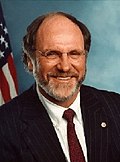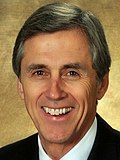Governor
Republican primary
Former U.S. Attorney Christopher J. Christie had long been considered the front-runner for the Republican nomination. He was heavily favored by the party establishment and had won the endorsement and county line of all county GOP organizations. [2] Christie's chief opponent in the primary was former Bogota mayor Steve Lonegan, known for his very right-wing positions and vocal opposition to the Corzine administration; another staunch conservative, General Assemblyman Rick Merkt was also on the ballot. David Brown, Christian Keller, and Franklin Township mayor Brian D. Levine also filed to run in the Republican primary, but their petitions were challenged by Lonegan and they were disqualified from the ballot when administrative judges ruled that their nominating petitions failed to meet the threshold of 1,000 valid signatures. [3] Upon leaving the race, Brown and Levine endorsed Christie. [4] [5]
Christie and Lonegan attacked each other relentlessly throughout the primary campaign through mailers and robocalls, with each seeking to undermine the other by drawing the public's attention to scandals involving the other. Lonegan proposed ending the state's progressive income tax system and replacing it with a 2.9% flat tax for all New Jerseyans. Christie strongly opposed this proposal, arguing that Lonegan's proposal would amount to a tax increase for most New Jerseyans. Christie instead proposed cutting taxes "across the board," although he refused to say by how much. [6] There were two televised debates, which excluded Merkt, and two radio debates, which included him. Ultimately, Christie was able to win the primary with 55% of the vote to Lonegan's 42% and Merkt's 3%.
The following Republican Primary candidates were removed from the ballot:
Democratic primary
Although polls indicated his vulnerability in the general election, Governor Jon S. Corzine was heavily favored to win the Democratic primary over his three little-known challengers. The only one of those to have held elected office, former Glen Ridge mayor Carl Bergmanson, was running on a platform of fiscal discipline, social liberalism, and government reform; he had received the support of the Citizens Against Tolls website. Roger Bacon, Democrat of Phillipsburg, an unsuccessful candidate for the United States House of Representatives in New Jersey's 5th congressional district in 2008, [10] and Jeff Boss, Democrat of Guttenberg, an unsuccessful candidate for United States Senate in 2008, [11] also ran. In the primary, Corzine won renomination with 77% of the vote, while Bergmanson, his closest competitor, received about 9%.
General election
Since the primaries, polls consistently showed Christie leading Corzine, sometimes by double digits. The election became a three-way race on July 7, when independent candidate Christopher Daggett announced that he had raised enough money to qualify for public funds and to qualify for participation in the debates. [12] On July 20, Christie selected Kim Guadagno as his running mate. [13] On July 24, Corzine announced in an e-mail to his supporters that he had selected Loretta Weinberg as his running mate. [14] On July 27, Daggett announced that he had selected longtime Kean University professor and administrator Frank J. Esposito as his running mate. [15]
Although the economy and taxes have long been prominent issues in the campaign, the issue of ethics and anti-corruption efforts was thrust into the spotlight in July when several public officials were arrested on corruption charges in Operation Bid Rig. One of Corzine's main lines of attack has involved Christie's ties to the unpopular former President of the United States George W. Bush, who appointed Christie to the U.S. Attorney's office in 2001. In August 2009, Bush political strategist Karl Rove revealed that he had held conversations with Christie about a potential gubernatorial run during Christie's time as U.S. Attorney. U.S. Attorneys are prohibited from engaging in partisan political activities by the Hatch Act of 1939. [16] Corzine quickly incorporated this into his advertisements targeting Christie. [17] Nonetheless, Christie defeated Corzine by 4 points.
Lieutenant governor
On November 8, 2005, voters passed a Constitutional amendment to the New Jersey State Constitution which created the office of Lieutenant Governor of New Jersey, the first of whom is to be elected in the 2009 general election and to take office in January 2010. Until the creation of the office, governors who died in office or stepped down were succeeded by the President of the New Jersey Senate. This has happened twice in recent years, with the resignations of Christine Todd Whitman in 2001 and James McGreevey in 2004. Concerns over the separation of powers, as Acting Governors continued to serve concurrently in the Senate, and the fact that Acting Governors were not elected by the people to succeed the Governor led to the Constitutional amendment that created the new office. All 12 candidates for governor appearing on the ballot selected their running mates by the June 27, 2009 deadline. [18]
Chris Christie, the Republican nominee for governor, selected Monmouth Beach's Kim Guadagno , the sheriff of Monmouth County, as his running mate. Others mentioned for the post had included New Jersey Senators Diane Allen and Jennifer Beck, as well as Bergen County Clerk Kathleen Donovan.
Incumbent Governor Jon Corzine, the Democratic nominee, selected Teaneck's Loretta Weinberg , a New Jersey Senator and former New Jersey General Assemblywoman, as his running mate. Other mentioned for the post had included New Jersey Senator Barbara Buono, New Jersey General Assemblywoman Bonnie Watson Coleman, and wealthy businessman Randal Pinkett.
Chris Daggett, an independent candidate who has qualified for matching funds, selected Ocean Township's Frank J. Esposito , a longtime professor and administrator at Kean University who served as an advisor to the Commissioner of Education in the Thomas Kean administration, as his running mate. Others mentioned for the post had included Edison Mayor Jun Choi, Atlantic County freeholder Alisa Cooper, and Passaic County freeholder James Gallagher.
This page is based on this
Wikipedia article Text is available under the
CC BY-SA 4.0 license; additional terms may apply.
Images, videos and audio are available under their respective licenses.








